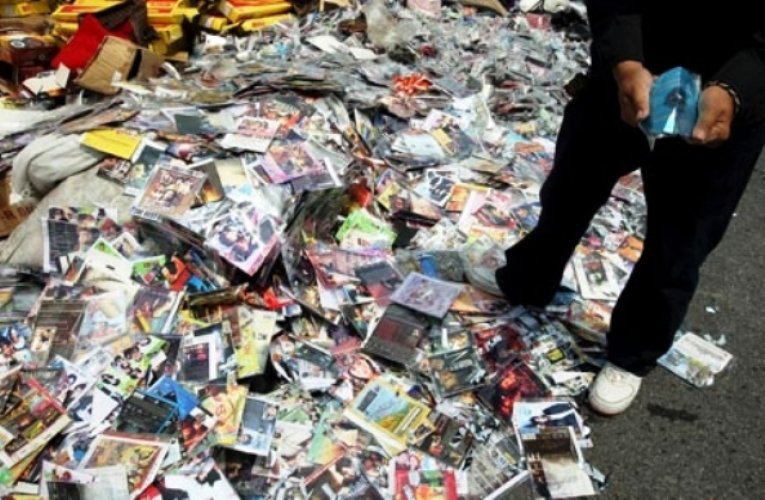
Audiovisual piracy in all its forms has developed considerably in Côte d’Ivoire in recent years. The phenomenon is part of this “informal” economy that has become so familiar in the daily environment, in the street, in the workplace and even in the home, that it seems “normal”. Pirated or duplicated CDs are sold for 250 or 500 francs from resellers who resell either 500 or 1000 francs depending on the market trend. During this time, artists are dragging the devil by the tail. Visit this universe that kills creation in Côte d’Ivoire.
M.B.J called in the Abidjanese jargon, ”pirate”, in his thirties has been duplicating artists’ CDs and productions for more than ten years. Through an acquaintance, he allows us to visit his production room.
Piles of burned CDs, pirated artist’s covers on the table, a computer, a central unit and a burning printer, that’s how he sums up his pirating arsenal.
With a wary look on his face, he welcomes us. But the fear persists. The reason: the agents of the Ivorian Copyright Office (Burida) and the police are the instigators of this fear. And for good reason: if they are arrested, they will be imprisoned and fined between one million and two million francs for the offence. But the tenacity of my companion got the better of his mistrust and fear and made him come out of his reserve.
M.B.J. introduces us to his “company” and its working tools. “I have been in this business for more than 10 years. I have a monitor, a central unit that I use to download sound from the net, USB keys and memory cards to recover the extracted work and finally a burner to burn blank CDs. I burn more than 1,000 CDs a day and I sell between 300 and 400 CDs a day, depending on demand, especially during festive periods such as Christmas and the end of the year when demand increases”. “Well, the lack of work and above all the high cost of original CDs, too high for some pockets, favours the boom and forces us into piracy”, he defends himself. For them, it is a way of helping consumers and helping themselves.
Here it is strictly forbidden to take pictures.
There are several categories of recorders: there are simple recorders and multi-track recorders with 2 recorders for 80 to 100 per minute, 4 to 8 recorders with a production of 600 to 1000 discs and the last one with a production of 20 discs in 10 minutes. In just one hour, the consumer is provided with new sounds and the latest trends on the market at low cost. The production is done in the market, in the home, in short, piracy does not exist.
The choice of the work to be duplicated
The choice is made according to the artist in vogue or the work of the moment. To do this they go to preference sites such as Ivoire plus, cas bien. Fr and many other sites. For those who do not know the world of the net, they buy the original work to pirate.
On the fringes of this activity, there is another branch that profits: it is the computer graphics artists who make the covers that embellish the CD. A cover costs 50 francs.
Production and sales
The pirate makes money easily on the back of the artist and his CDs are distributed on a national scale in the ten communes of Abidjan and in the interior of the country. These same “pirates” can be both producers and resellers, while others deliver to resellers. These artists’ works are sold on all the main streets: Adjamé-liberté, Yopougon-Siporex to Abobo-gare, etc.
At the Black Market in Adjamé, there are several shops, some of which specialise in duplicating CDs. The shop that receives belongs to N.H. On the other hand, the only difference in terms of equipment lies in the engraving printer, an impressive machine named Robot graveur, in the shape of a central unit that can engrave from 10 to 50 discs in 5 and 10 minutes, producing more than 1000 discs per day.
The cost of this “monster” varies between 200,000 and 300,000 CFA francs. For him, the rise of piracy is due to the evolution of the music industry: “Before piracy was less with vinyl, LPs and 45s, it was impossible to pirate. Piracy really started with the advent of audio cassettes where you could duplicate as you wished, on audio or video tape,” explains our interviewee. However, he believes that faced with the repression of the police, they are now obliged to be more discreet in their daily operations.
Every year many pirates are arrested and thousands of CDs destroyed. But the phenomenon is still going strong! A brigade to fight against






0 Comments